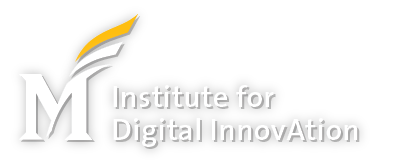Faculty Spotlight: Abhishek Ray
Abhishek Ray, PhD. is an Assistant Professor in the Information Systems & Operations Management Department (ISOM) at George Mason University. He is also an Affiliate Faculty at the Institute for Digital InnovAtion and the Business for a Better World Center at George Mason University.
His work addresses problems at the intersection of Economics, Operations Management and Information Technology & Systems and he uses Game Theory, Econometrics & Artificial Intelligence/Machine Learning methodologies to frame and solve research problems. The Institute for Digital InnovAtion talked with Ray about his research. Responses have been edited.
__________________________________________________________________________
Tell us about your research.
I focus on problems that are at the intersection of Information Systems, Economics & Operations Research. These problems are inherently complex, require interdisciplinary approaches and, in the end, prove to be vast in their scope and impact. I tend to focus on portions of these vast problems and solve those parts using either mathematical tools such as Game Theory or computational tools such as Machine Learning. In this way, my overall objective is to build a body of work solving various parts of these vast, complex problems and provide solutions and insights that prove beneficial to commercial stakeholders as well as social planners and welfare considerations.
As an example, consider the problem of increasing complexity around conducting industrial grade combinatorial auctions with increasing digitization of such auction mechanisms. Evidently, as more such auctions are being conducted online, more companies are participating and so auctioneers are finding it difficult to handle, e.g., the volume of bids. Among the many aspects of this problem, one major aspect is how to improve the speed of auction closing in a way that is beneficial to auctioneers and companies that bid in such auctions. One way is to improve the accuracy of determining auction winners when increasing the speed of computing auction winners. Turns out, this problem is notoriously hard to solve and stakeholders (e.g., the FCC) have been looking for a good way of resolving this trade-off. My recently published paper in Information Systems Research (a top IS journal) provides a solution to this problem. I propose a framework built on a flexible algorithm that resolves this trade-off better than the past 20 such attempts.
What kinds of projects are you working on?
Currently I am working on three projects with faculty both in and outside of GMU. First, I am working on a paper that analyzes the serious problem of ad-fraud online. Ad-fraud is only second to the drug trade as a way for organized crime to make money. Its increasing influence threatens online content availability and creation. We analyze the role ad-networks play in controlling (elimination, we find, is difficult if not impossible) fraud on their networks by using a regulatory mechanism consisting of strict technology configuration and revenue sharing.
Second, I am working on a paper that deals with the complex problem of human trafficking and how law enforcement and other social planners can allocate surveillance resources across some geographical area such that surveillance errors are minimized while achieving targets set by these stakeholders in apprehending perpetrators/victims. In order to test the effectiveness of our proposed model, we are using data from two major organizations involved in surveillance efforts to curb human trafficking in Asia and South East Asia.
Third, I am studying the phenomenon of Cryptocurrency mining pools and designing optimal reward contracts that reduce chances of sabotage by malicious actors and incentivize honest actions. Sabotage attacks threaten existence of mining pools and so this work will focus on helping the mining pool industry be more robust to attacks and fairer to its participants.
How do your projects impact other disciplines?
In the previously outlined projects as well as in general, my attempt is to add to literature in the three reference disciplines I work on — Information Systems being the primary one — and the others being Economics & Operations Research. For instance, using my published work on combinatorial auctions, I add to work on Computational Intelligence in Optimization (Operations Research) along with auction support in bidding platforms (Information Systems). Further, in the works-in-progress, my proposed contributions will be majorly towards regulatory mechanisms for digital platforms (Information Systems), incentive issues and design of optimal mechanisms that prevent certain behaviors (Economics), and resource allocation models that minimize outcome errors (Operations Research).
What projects would you like to be reached out to for potential collaborations?
I am interested in any aspect of technology, digital platforms and mechanisms that impact not only business bottom-lines but also social justice, welfare and processes. So, anyone looking at a problem that needs technology, is a result of using technology, or needs a design that uses technology can reach out to me for potential collaborations.
What keywords describe your research?
Systems design, economic models, game theory, optimization
How can you be reached?

